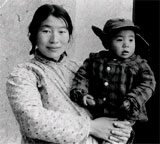CHINA
 The country is planning to re-target its family planning programme in the rural areas to stem population growth and reduce the wide economic chasm between urban and rural citizens, announced Premier Li Peng recently. In an address to the national People's Congress, Li said that the government's one-child policy, which so far had been implemented on the urban Chinese, would be henceforth applied to peasants and rural migrants.
The country is planning to re-target its family planning programme in the rural areas to stem population growth and reduce the wide economic chasm between urban and rural citizens, announced Premier Li Peng recently. In an address to the national People's Congress, Li said that the government's one-child policy, which so far had been implemented on the urban Chinese, would be henceforth applied to peasants and rural migrants.
Currently, urbanites are allowed only one child per couple. The rural folk are allowed two children, while ethnic groups like Mongols, Tibetans and Uighurs are permitted two and sometimes three children.
The change in policy is aimed at rectifying problems like oversupply of labour, slumping income of farmers, rampant rural-urban migration and rising crime rates. "We should give priority to family planning in rural areas, and among the floating population, and combine family planning with efforts to assist farmers to shake off poverty," said Li.
Related Content
- Disruption and Disarray: An analysis of pangolin scale and ivory trafficking, 2015-2024
- Asian Development Outlook- April 2025
- Global Electricity Review 2025
- Global electricity review 2024
- Regional economic outlook for Asia and Pacific: steady growth amid diverging prospects
- A global incentive scheme to reduce carbon emissions
